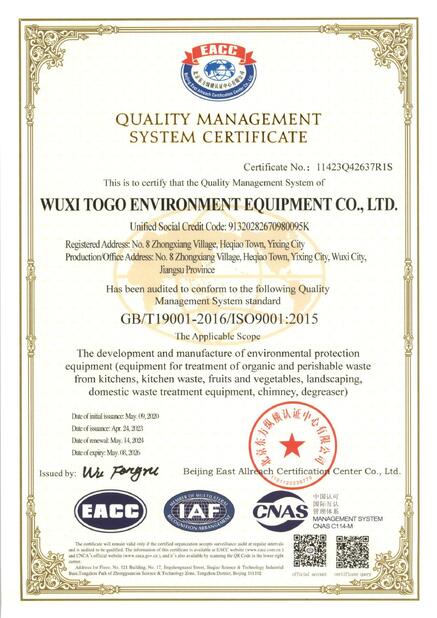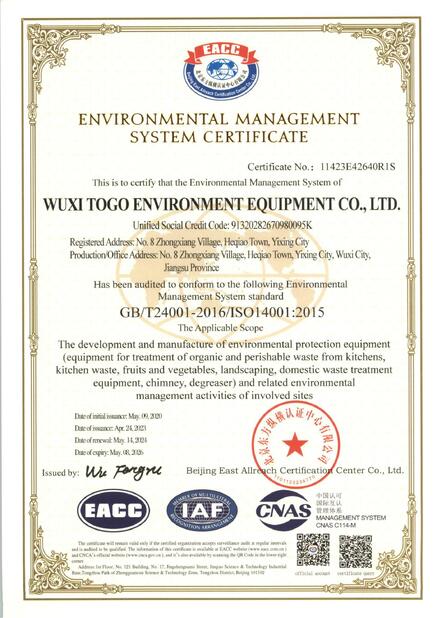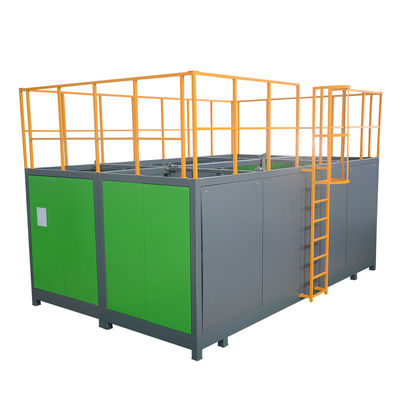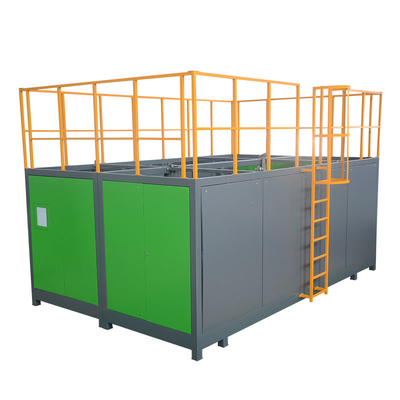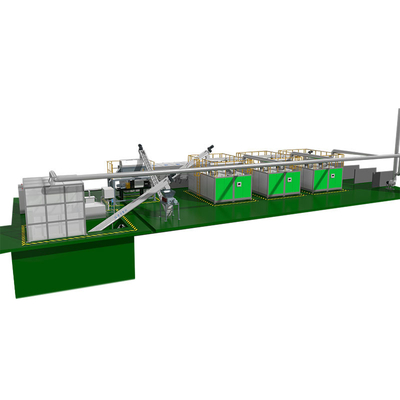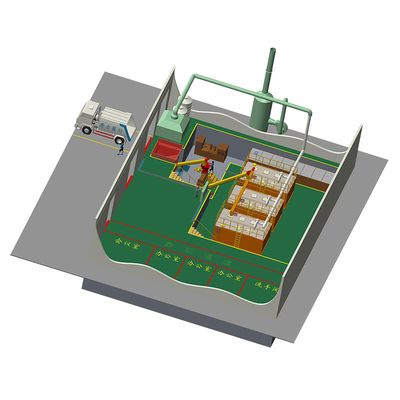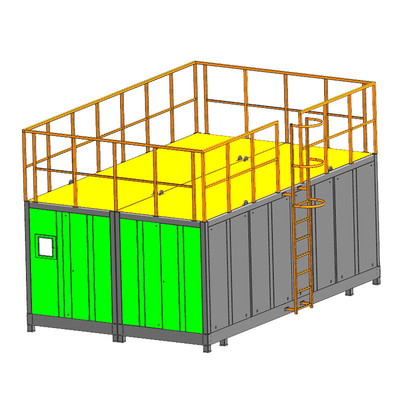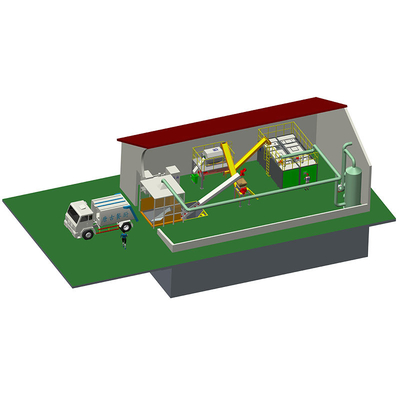Large Scale Food Waste Composting Production Line - 100T/Day
Product Description:
Waste management is an investment in the ecology as well as the future. Soon industries that produce a lot of organic wastes like hotels, restaurants, flight kitchens, caterers, malls, apartments, canteens will need to start managing their own waste. If not taken care of, food waste management can create headaches for your business and hinder your path to progress.
Organic waste is a type of biodegradable waste of plant or animal origin, containing mainly carbohydrates, proteins, fats, etc. Organic waste comes from expired food, spoiled fruit, and vegetables, catering waste, slaughterhouse waste, etc. Normal landfill disposal is not only wasteful but also polluting (the methane gas produced by anaerobic decomposition is a greenhouse gas 20 times worse than carbon dioxide). The use of the composting system to reduce the size of organic waste and make compost, or for the production of feed is now a popular method of disposal.
Output Product: Organic Fertilizer
| NO. |
Item |
Parameter |
| 1 |
Model |
TG-CC-100T |
| 2 |
Rated Capacity |
≥100T/Day |
| 3 |
Waste Reduction Rate |
≥90% |
| 4 |
Ambient Temperature |
-10~40℃ |
| 5 |
Electrical System (Installation of Independent Meter) |
380V |
| 6 |
Processing Cycle |
24H |
| 7 |
Processing Method |
Microbial Fermentation and Hot Air Drying |
| 8 |
Control System |
Automatic Control System |
| 9 |
Heating Mode |
Electric Heating, Water Heating |
| 10 |
Fermentation Temperature Control Range |
65~75℃ |
| 11 |
Feeding Mode |
Continuous or Intermittent |
| 12 |
Noise |
65dB |
| 13 |
Coverage of Facilities |
Provided on site |
| 14 |
Main Material |
304 stainless steel is used for the main body and the part contacting materials. |
| 15 |
Host Panel |
Stainless steel, no obvious dents, scratches, and burrs, no sharp edges and corners. |
Main Process: Dumping → Sorting → Discharge Auger Conveyor → Shredding → Solid-Liquid Separation → Oil-Water Separation → Fermentation → Deodorization → Output
Treatment Process:
1. Organic waste is uniformly recycled and transported to the treatment station and dumped in the unloading hopper by kitchen waste transportation vehicles, spiral conveying to the crushing system, and pressing dehydration system.
2. Organic waste adopts a physical method to efficiently crush and dehydrate kitchen waste organic matter.
3. After pressing and dehydration, it will be automatically transported to the fermentation bin. After 24-hour treatment of kitchen waste, appropriate temperature, humidity, and oxygen content shall be controlled to accelerate the propagation of bacteria and improve the degradation rate.
4. After the reaction reaches a certain time, the material is discharged through mechanical mode, and the product can be used as organic fertilizer or soil conditioner.
5. For the wastewater in the treatment process, the oil and water are separated by the oil-water separation equipment, the waste oil is sold directly, and the wastewater can be treated by the later sewage treatment system.
6. In the process of kitchen waste treatment, TOGO is equipped with corresponding equipment for treatment.






FAQs:
1. What Is Compost?
Composting is the natural process of decomposition and recycling of organic material into a humus rich soil amendment known as compost. For any business or institution producing food waste, this organic material can be easily decomposed into high quality compost.
2. What Can Be Composted?
Fruits, vegetables, dairy products, grains, bread, unbleached paper napkins, coffee filters, eggshells, meats and newspaper can be composted. If it can be eaten or grown in a field or garden, it can be composted. Items that cannot be composted include plastics, grease, glass, and metals -- including plastic utensils, condiment packages, plastic wrap, plastic bags, foil, silverware, drinking straws, bottles, polystyrene or chemicals. Items such as red meat, bones and small amounts of paper are acceptable, but they take longer to decompose. Add red meat and bones to only a well-controlled compost pile to avoid attracting vermin, pests and insects to partially decomposed meat scraps.
3. Does it need to be on 24 hours?
Yes, the machine has to be connected to the source for 24 hours. However, it consumes power only from 8 to 11 hours depending on the humidity content of the waste. However, the air supply blower and the electronic circuit would operate for 24 hours.
4. Does TOGO require a skilled operator?
No. As it is fully automatic, the garbage collector can just open the lid and dump the segregated waste into it.
5. What can I do with the compost?
The compost can be used in one of the following ways:
-
It can be used for the gardens in the premises as a soil nutrient.
-
It can be sold to the fertilizer companies or on e-commerce websites like Amazon where it can fetch Rs. 50/Kg or more.
-
It can be donated to the nearby nurseries or to the farmers and you can be a contributor to the development of the nation.
-
A local government body might collect the compost depending upon where you are.
6. Benefits of Compost to the Environment
- Water and soil conservation.
- Protects groundwater quality.
- Minimizes odors from agricultural areas.
- Avoids methane production and leachate formation in landfills by diverting organics from landfills into compost.
- Prevents erosion and turf loss on roadsides, hillsides, playing fields and golf courses.
- Drastically reduces the need for pesticides and fertilizers.
- Binds heavy metals and prevents them from migrating to water resources, being absorbed by plants, or being bioavailable to humans.
- Off-farm materials can be brought in and added to manure to make compost.
- Facilitates reforestation, wetlands restoration, and wildlife habitat revitalization efforts by amending contaminated, compacted and marginal soils.
- Off-farm materials can be brought in and added to manure to make compost.
- Composted manure weights about one-fourth as much as raw manure per ton.

 Your message must be between 20-3,000 characters!
Your message must be between 20-3,000 characters! Please check your E-mail!
Please check your E-mail!  Your message must be between 20-3,000 characters!
Your message must be between 20-3,000 characters! Please check your E-mail!
Please check your E-mail! 
